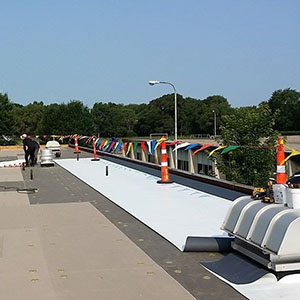
For commercial property owners, the roof is one of the most critical building components to manage. A roof must withstand daily UV exposure, precipitation, high winds, and temperature swings while maintaining a watertight seal. Among today’s advanced roofing technologies, single-ply roofing systems deliver some of the most reliable performance available.
Incore Restoration Group provides expert installation and service of single-ply systems in Canton, MI, including TPO, PVC, and EPDM, all designed to maximize efficiency, longevity, and overall building protection. Call 866-685-0009 to speak with an expert today.
The Smart Choice: Single-Ply Roofing
The Engineering Behind Single-Ply Roofing
Single-ply roofing membranes are engineered sheets of synthetic polymers applied in large rolls to create a continuous waterproof layer. These membranes are typically 40 to 80 mils thick and reinforced with polyester or fiberglass for added strength.
Installation is performed using one of three primary methods:
- Mechanically fastened systems: Anchored with fasteners along the seams, allowing for strong wind resistance and flexibility across large roof areas.
- Fully adhered systems: Bonded to the substrate with adhesives, creating excellent uplift resistance and a smooth, aesthetically clean surface.
- Ballasted systems: Secured with stone or pavers, often chosen for speed of installation, and added fire resistance.
The seams between sheets are the most critical element of performance. Instead of relying on adhesives alone, TPO and PVC systems use hot-air welding to fuse sheets into a monolithic surface that is stronger than the membrane itself. EPDM seams are typically bonded with specialized seam tape or liquid adhesives, providing a flexible yet durable seal.
Types of Single-Ply Roofing Systems
TPO (Thermoplastic Polyolefin):
TPO membranes combine polypropylene and ethylene-propylene rubber, creating a strong yet flexible product. Their highly reflective surface helps reduce rooftop temperatures, which lowers cooling loads and extends HVAC performance. TPO is also naturally resistant to UV degradation and chemical attack, making it ideal for large commercial facilities seeking both efficiency and durability.
PVC (Polyvinyl Chloride):
PVC membranes are highly resistant to chemicals, oils, and industrial byproducts. With hot-air welded seams, PVC systems create an extremely watertight surface, reducing long-term leak risks. Fire resistance is another advantage of PVC, as the chlorine content in the membrane helps inhibit flame spread. This makes PVC an ideal solution for restaurants, industrial plants, and facilities where chemical exposure is common.
EPDM (Ethylene Propylene Diene Monomer):
EPDM is a synthetic rubber membrane with a proven track record spanning over 50 years. Available in both black and white options, EPDM is especially valued for its ability to stretch and flex under thermal expansion. This elasticity allows it to withstand extreme freeze-thaw cycles without cracking, which is vital in Michigan’s variable climate. EPDM systems are also easy to repair, making them an excellent choice for long-term serviceability.

Long-Term Performance and Lifespan
Single-ply roofing membranes are engineered for durability and typically deliver 20 to 30 years of performance when properly installed and maintained. Their wide sheets reduce the number of seams, minimizing weak points. TPO and PVC’s hot-air welded seams can exceed the strength of the membrane itself, offering exceptional leak resistance. EPDM’s resilience against ozone and UV radiation allows it to maintain flexibility and weatherproofing for decades.
When paired with insulation boards, single-ply systems also provide excellent thermal performance. High R-value assemblies can be designed to meet or exceed modern energy codes, lowering long-term heating and cooling costs for building owners.
Maintenance and Renewability
Maintenance for single-ply systems is straightforward. Regular inspections should focus on seams, flashings, and penetrations, which can be quickly repaired if needed. Membranes can also be cleaned to maintain reflectivity and energy performance. In many cases, when a single-ply system nears the end of its service life, it can be restored with a fluid-applied roof coating, adding another 10 to 15 years of functionality without requiring a full tear-off.
Single-Ply Roofing Professionals
The science of single-ply roofing requires precise installation to perform at its best. Incore Restoration Group has extensive experience with TPO, PVC, and EPDM systems across Southeast Michigan. Our crews use proven installation techniques, industry-leading equipment, and a deep understanding of regional weather conditions to ensure each project achieves maximum durability and efficiency.
If your commercial facility in Canton, Ann Arbor, Livonia, Dearborn, or greater Southeast Michigan is considering a roofing upgrade, trust Incore Restoration Group for expert single-ply roofing solutions. Contact us today at 866-685-0009 to schedule a consultation and learn how TPO, PVC, or EPDM can deliver long-term value for your property.
FAQ
How long does a single-ply roofing system last?
Most single-ply systems provide 20 to 30 years of reliable service, with proper maintenance and professional installation.
Which installation method is best for single-ply roofing?
The right choice depends on the building: mechanically fastened for large areas, fully adhered for high wind zones, and ballasted for rapid installation.
Why choose single-ply roofing over built-up systems?
Single-ply offers lighter weight, fewer seams, faster installation, and improved energy efficiency compared to traditional multi-layer roofs.
